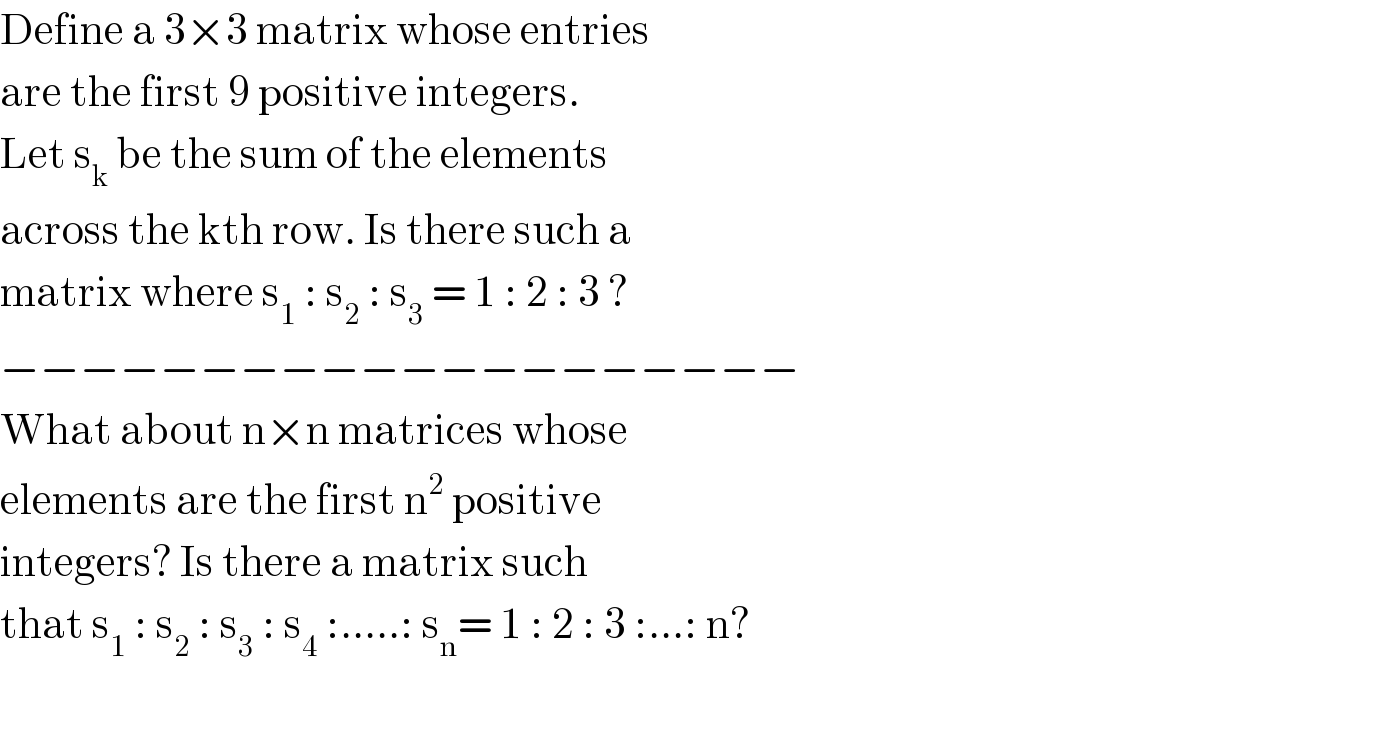Question Number 8236 by Yozzias last updated on 03/Oct/16

$$\mathrm{Define}\:\mathrm{a}\:\mathrm{3}×\mathrm{3}\:\mathrm{matrix}\:\mathrm{whose}\:\mathrm{entries} \\ $$$$\mathrm{are}\:\mathrm{the}\:\mathrm{first}\:\mathrm{9}\:\mathrm{positive}\:\mathrm{integers}. \\ $$$$\mathrm{Let}\:\mathrm{s}_{\mathrm{k}} \:\mathrm{be}\:\mathrm{the}\:\mathrm{sum}\:\mathrm{of}\:\mathrm{the}\:\mathrm{elements} \\ $$$$\mathrm{across}\:\mathrm{the}\:\mathrm{kth}\:\mathrm{row}.\:\mathrm{Is}\:\mathrm{there}\:\mathrm{such}\:\mathrm{a}\: \\ $$$$\mathrm{matrix}\:\mathrm{where}\:\mathrm{s}_{\mathrm{1}} \::\:\mathrm{s}_{\mathrm{2}} \::\:\mathrm{s}_{\mathrm{3}} \:=\:\mathrm{1}\::\:\mathrm{2}\::\:\mathrm{3}\:? \\ $$$$−−−−−−−−−−−−−−−−−−−− \\ $$$$\mathrm{What}\:\mathrm{about}\:\mathrm{n}×\mathrm{n}\:\mathrm{matrices}\:\mathrm{whose} \\ $$$$\mathrm{elements}\:\mathrm{are}\:\mathrm{the}\:\mathrm{first}\:\mathrm{n}^{\mathrm{2}} \:\mathrm{positive} \\ $$$$\mathrm{integers}?\:\mathrm{Is}\:\mathrm{there}\:\mathrm{a}\:\mathrm{matrix}\:\mathrm{such} \\ $$$$\mathrm{that}\:\mathrm{s}_{\mathrm{1}} \::\:\mathrm{s}_{\mathrm{2}} \::\:\mathrm{s}_{\mathrm{3}} \::\:\mathrm{s}_{\mathrm{4}} \::…..:\:\mathrm{s}_{\mathrm{n}} =\:\mathrm{1}\::\:\mathrm{2}\::\:\mathrm{3}\::…:\:\mathrm{n}? \\ $$$$ \\ $$
Commented by Rasheed Soomro last updated on 03/Oct/16
![s_1 +s_2 +s_3 =((9×(9+1))/2)=45 [∵ s_1 ∪ s_2 ∪s_3 ={1,2,3,...,9}] If 45 is divided in 1:2:3 s_1 =((45)/6) =((15)/2) .But sum of three whole numbers may not be fraction. So such 3×3 matrix is not possible. Similarily for n×n matrix s_1 +s_2 +s_3 +...+s_n =((n^2 (n^2 +1))/2) [∵ s_1 ∪ s_2 ∪s_3 ...∪s_n ={1,2,3,...,n^2 } If s_1 : s_2 : s_3 : s_4 :.....: s_n = 1 : 2 : 3 :...: n s_1 =(((n^2 (n^2 +1))/2)/((n(n+1))/2)) must be whole number. s_1 =((n^2 (n^2 +1))/2)×(2/(n(n+1)))=((n(n^2 +1))/(n+1)) But this is not whole number in geneal. So in general such n×n matrix is not possible.](https://www.tinkutara.com/question/Q8238.png)
$$\mathrm{s}_{\mathrm{1}} +\mathrm{s}_{\mathrm{2}} +\mathrm{s}_{\mathrm{3}} =\frac{\mathrm{9}×\left(\mathrm{9}+\mathrm{1}\right)}{\mathrm{2}}=\mathrm{45}\:\:\:\:\left[\because\:\mathrm{s}_{\mathrm{1}} \cup\:\mathrm{s}_{\mathrm{2}} \cup\mathrm{s}_{\mathrm{3}} =\left\{\mathrm{1},\mathrm{2},\mathrm{3},…,\mathrm{9}\right\}\right] \\ $$$$\mathrm{If}\:\mathrm{45}\:\mathrm{is}\:\mathrm{divided}\:\mathrm{in}\:\mathrm{1}:\mathrm{2}:\mathrm{3} \\ $$$$\mathrm{s}_{\mathrm{1}} =\frac{\mathrm{45}}{\mathrm{6}}\:=\frac{\mathrm{15}}{\mathrm{2}}\:.\mathrm{But}\:\mathrm{sum}\:\mathrm{of}\:\mathrm{three}\:\mathrm{whole}\:\mathrm{numbers}\:\mathrm{may} \\ $$$$\mathrm{not}\:\mathrm{be}\:\mathrm{fraction}. \\ $$$$\mathrm{So}\:\mathrm{such}\:\mathrm{3}×\mathrm{3}\:\mathrm{matrix}\:\:\mathrm{is}\:\mathrm{not}\:\mathrm{possible}. \\ $$$$ \\ $$$$\mathrm{Similarily}\:\mathrm{for}\:\mathrm{n}×\mathrm{n}\:\mathrm{matrix} \\ $$$$\mathrm{s}_{\mathrm{1}} +\mathrm{s}_{\mathrm{2}} +\mathrm{s}_{\mathrm{3}} +…+\mathrm{s}_{\mathrm{n}} =\frac{\mathrm{n}^{\mathrm{2}} \left(\mathrm{n}^{\mathrm{2}} +\mathrm{1}\right)}{\mathrm{2}}\:\left[\because\:\:\mathrm{s}_{\mathrm{1}} \cup\:\mathrm{s}_{\mathrm{2}} \cup\mathrm{s}_{\mathrm{3}} …\cup\mathrm{s}_{\mathrm{n}} =\left\{\mathrm{1},\mathrm{2},\mathrm{3},…,\mathrm{n}^{\mathrm{2}} \right\}\right. \\ $$$$\mathrm{If}\:\:\mathrm{s}_{\mathrm{1}} \::\:\mathrm{s}_{\mathrm{2}} \::\:\mathrm{s}_{\mathrm{3}} \::\:\mathrm{s}_{\mathrm{4}} \::…..:\:\mathrm{s}_{\mathrm{n}} =\:\mathrm{1}\::\:\mathrm{2}\::\:\mathrm{3}\::…:\:\mathrm{n} \\ $$$$\mathrm{s}_{\mathrm{1}} =\frac{\frac{\mathrm{n}^{\mathrm{2}} \left(\mathrm{n}^{\mathrm{2}} +\mathrm{1}\right)}{\mathrm{2}}}{\frac{\mathrm{n}\left(\mathrm{n}+\mathrm{1}\right)}{\mathrm{2}}}\:\mathrm{must}\:\mathrm{be}\:\mathrm{whole}\:\mathrm{number}. \\ $$$$\mathrm{s}_{\mathrm{1}} =\frac{\mathrm{n}^{\mathrm{2}} \left(\mathrm{n}^{\mathrm{2}} +\mathrm{1}\right)}{\mathrm{2}}×\frac{\mathrm{2}}{\mathrm{n}\left(\mathrm{n}+\mathrm{1}\right)}=\frac{\mathrm{n}\left(\mathrm{n}^{\mathrm{2}} +\mathrm{1}\right)}{\mathrm{n}+\mathrm{1}} \\ $$$$\mathrm{But}\:\mathrm{this}\:\mathrm{is}\:\mathrm{not}\:\mathrm{whole}\:\mathrm{number}\:\mathrm{in}\:\mathrm{geneal}. \\ $$$$\mathrm{So}\:\mathrm{in}\:\mathrm{general}\:\mathrm{such}\:\mathrm{n}×\mathrm{n}\:\mathrm{matrix}\:\mathrm{is}\:\mathrm{not}\:\mathrm{possible}. \\ $$
Commented by Yozzias last updated on 03/Oct/16

$$\mathrm{Thanks}! \\ $$
Answered by Yozzias last updated on 04/Oct/16

$$\mathrm{Answer}\:\mathrm{in}\:\mathrm{comments}. \\ $$
